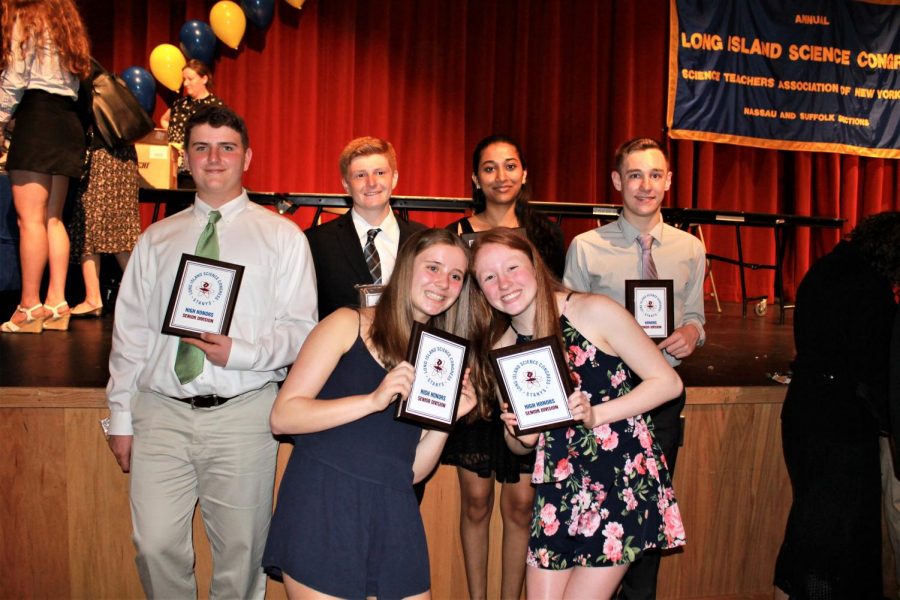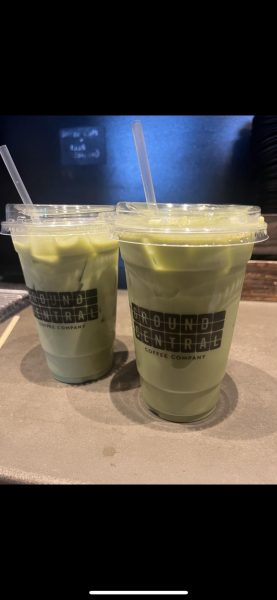Understanding the Success of LHS Researchers
High school researchers with awards at the Long Island Science Congress
High school science research competitions are not a common topic of conversation. Most people do not know or think about the work done by high school researchers right here at LHS. The reason not many people know or care about high school research is because they likely think it is a fringe club for nerdy science geeks. The truth, however, is that high school research is very much like a varsity level sport, they just compete with a different muscle: the brain. The 2018-2019 school year has been a record-setting year for the LHS research department. With Kaylie Hausknecht competing in and winning first in category at the International Science and Engineering Fair (ISEF), Pooja Shah winning highest honors at the Long Island Science Congress (LISC), and six LHS sophomores winning honors and high honors at LISC, the LHS research department has become a force to be reckoned with. Much like schools that are well-known for exemplary sports programs, there are some schools that are known for the successes of their researchers, and LHS is well on its way to earning a spot among their ranks.
High school researchers also face a great deal of stress when completing their projects and presenting them. The process of choosing and developing a project is extremely mentally exacting. Every researcher who hopes to see their project to its fruition must truly believe in their project. It is nearly impossible to give the level of dedication necessary to finish a great project without that belief. Sophomore researcher Sarah Denker described the work that goes into a research project: “I devoted a lot of time this year to my project because it needed to be done after school. This led to me spending hours of extra time in the lab with my partners and Mr. Vessalico. Even so, at the end you feel accomplished knowing that your project didn’t come from nothing, but instead, it came from the hard work of you and your partners.” It is also impossible to convince a judge that a project is worthy of an award if the researcher does not believe it his/herself. Judging itself is a harrowing experience: “The feeling of being judged is kind of like being a starter in a playoff game,” commented high honors award winner and sophomore Luke Maroney. The similarities between the competitiveness of school sports and research do not stop at the stress they induce.
Categories are one of the most complicated parts of research competitions. With twenty or more categories in most research competitions, it is hard to keep track of them all. Maroney explained, “Your category is kind of like what event that you are competing in for track.” In the same way that all track events are a way of proving that you are more physically dominant in your specific area than the rest–it does not matter if you are competing in physics or social science–your goal is to convince your judge that your project is better than that of the competition. Scoring for a research event is relatively simple. Judges spend a few minutes with each project and the researcher has that amount of time to convince the judge of the worthiness of their project. The judges’ scores are then combined, and the winners are announced. While the judges do their best to be impartial, the judging process can never be completely impartial. Similar to a sport like diving or gymnastics, where a group of judges give scores out of ten based on their opinion, there are some differences in the preferences of the judges themselves. One judge may prefer front flips or statistical analysis, while others may be all about the launch or the introduction. LISC honors award winner Joshua Santoro described the awards process: “It’s kind of like winning a medal at the Olympics: honors is bronze, high honors is silver, and highest honors is gold.”
High school research is not some distant activity that belongs only to a small group of science lovers. The world of research has something for everyone: high stakes, intense action, and even rivalries. It has its share of momentous highs and heartbreaking lows. Every competition gives some the taste of victory and makes them hunger for more. And every competition leaves some vowing to come back with fiery passion to achieve the glory that was so nearly theirs. It is evident to even the most casual observer of any competitive research event that there is something special there, and they are left wondering how much more exciting it would be to see this spectacle with full knowledge of what is unfolding. As anyone who has made the effort to understand the world of high school research can tell you, it is most certainly worth it.






















